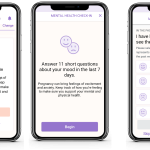Mother’s Day is a chance to honor our moms, sisters, grandmothers and daughters with flowers, chocolates, and breakfast in bed. But Mother’s Day is also a reminder about the challenges moms face, including maternal depression. One out of five women will experience an episode of depression in her lifetime, and two-thirds of those women are mothers.
A number of recent studies have shown that maternal depressionis the number one risk factor for children developing psychiatric and behavioral problems later in life – more so than even peer experiences such as bullying. At the same time, when more than one family member experiences mental health challenges, it becomes increasingly difficult for the entire family to heal. This is important because mental illness tends to cluster in families, so that mothers struggling with depression may also face additional mental health problems themselves while trying to find help for their kids who suffer with attention deficit-hyperactivity disorder (ADHD), conduct problems, depression or anxiety. This is especially hard for families when the mother herself—someone on whom everyone relies—is affected with mental illness.
Unfortunately, when a child is being treated for a psychiatric illness and the child’s mother suffers from depression, the child is much less likely to recover from his own illness, despite treatment. As it turns out, when children face other challenges such as poverty, neighborhood violence or family conflict, “maternal warmth” is a key protective factor against depression and behavioral problems. Furthermore, successful prevention efforts for emotional and behavioral problems in kids can also help with improvements in maternal depression, and successful treatment of maternal depression can help kids recover from their own illnesses. In fact, the pathway of many successful prevention programs targeted toward kids is through improvement in moms’ depression. So, healthy moms mean healthier kids, and healthier kids mean healthier moms.
Importantly, interventions exist to encourage maternal warmth and to help mothers and kids have more positive interactions. Some interventions target the quality of interaction (e.g., parent-child interactive therapy which focuses on parents of preschoolers, or parent training, which teaches parents to support their children’s positive behaviors), and others focus on mothers’ mood (e.g., interpersonal therapy, cognitive behavioral therapy). In research studies, maternal warmth toward kids can be “measured,” as it can be reported by moms themselves, observed in the lab or home (e.g., mother-child interactions about problems/conflicts or happy experiences), or reported by kids or other adults.
More good news is that maternal depression can be treated. There are evidence-based psychotherapies and pharmacologic treatments for depression available to moms, sisters, grandmothers and daughters. Be sure to talk to your doctor to find out which treatment approach is right for you or your loved one.
Here in Pittsburgh, two studies are currently examining maternal depression. The MOMS studylooks at the impact of treating maternal depression on children who are experiencing a range of mental health difficulties. The study is testing two psychotherapies as possible treatments for maternal depression and looking at the impact of maternal depression treatment on both mothers and their children.
Also, the Pitt Mother & Child project has studied boys from low-income backgrounds and their mothers over a nearly 20-year period to determine how early social context risks, including maternal depression, dangerous neighborhoods, and harsh parenting throughout childhood, can influence the development of problems such as antisocial behavior, substance use and depression. This study is also investigating how boys’ early social experiences are related to their brain function during adolescence and early adulthood.
We know that moms want to be the best moms they can be. To be at your best, however, you need to address your emotional health as well as your physical health. Emotional health is important not just for mothers but also for the entire family.
Holly A. Swartz, M.D., and Erika E. Forbes, Ph.D. are associate professors of Psychiatry, at Western Psychiatric Institute and Clinic of UPMC and the University of Pittsburgh School of Medicine.









